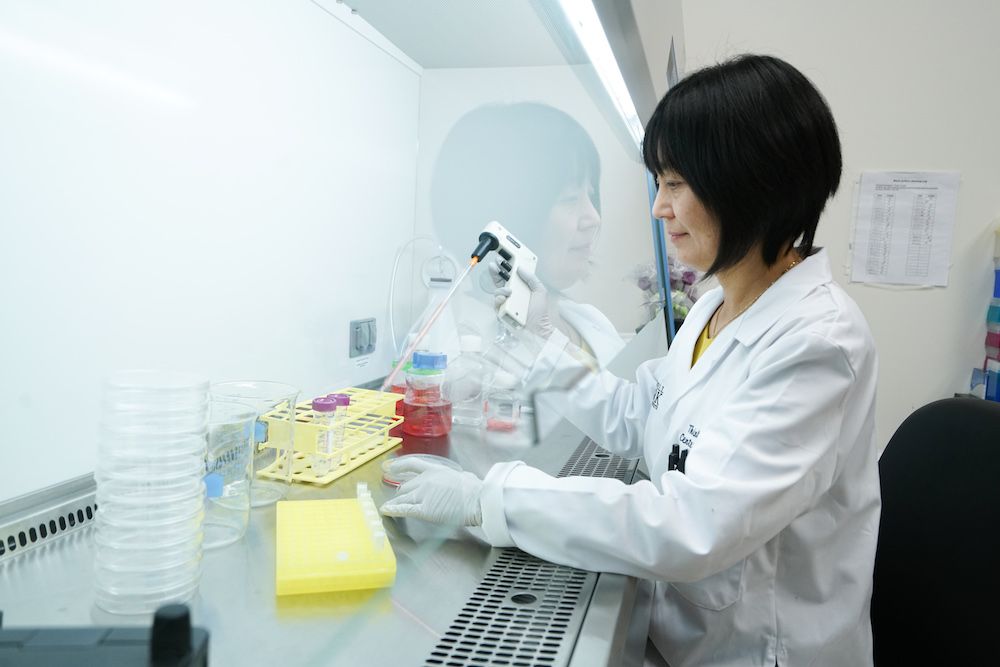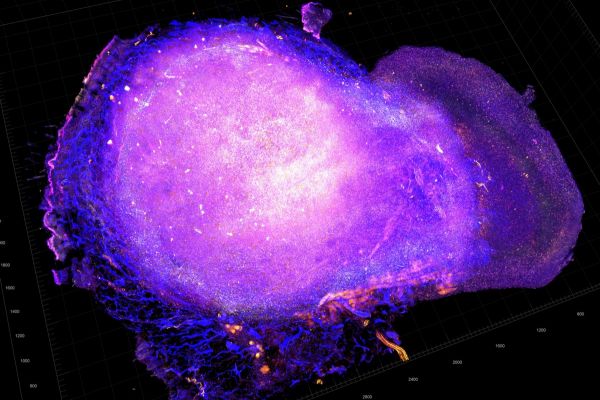"Few centers across the country are doing this, and we are one of them"
If you’re a cancer patient, your immune system may already be trying to destroy the tumor inside you — but it might need a little help.
Almost 15 years ago, researchers at Roswell Park Comprehensive Cancer Center published some of the first evidence that the body sends out T cells — special white blood cells that are part of the immune system — to attack tumors. Kunle Odunsi, MD, PhD, and his colleagues observed that the tumors of some ovarian cancer patients were full of T cells that had managed to work their way inside the tumor. When there were many of these T cells, called tumor-infiltrating lymphocytes (TILs), the patients tended to live longer.
Cutting-Edge Therapies
We offer clinical trials of immunotherapies at Roswell Park.
“That led us to ask questions,” says Dr. Odunsi, who was formerly the Deputy Director of Roswell Park, Chair of the Department of Gynecologic Oncology and Executive Director of the Division of Translational Immuno-Oncology. “We asked, ‘What is attracting those TILs to the tumor site?’ We thought that because they were associated with better survival, they might be trying to destroy tumor cells, and that’s why those patients did better.”
The same theory led Steven Rosenberg, MD, PhD, Chief of the Surgery Branch at the National Cancer Institute, to first extract TILs from the tumor of a melanoma patient. He then multiplied them and gave them back to the patient in a process very much like a blood transfusion. The results of the first clinical trials were “very, very encouraging,” says Dr. Odunsi. “Some patients demonstrated remarkable responses.”
Since then, further research has enabled researchers to better understand TILs and the ways they can be multiplied, or expanded, in the laboratory. But that’s just the beginning. “Every cell in your body has a lifespan,” explains Dr. Odunsi. “An immune cell doesn’t live forever. So how do you extend its life a little bit so it can destroy the tumor before it fades away? We’ve learned a lot about strategies to achieve that.”
Division of Translational Immuno-Oncology at Roswell Park
Whether you are newly diagnosed with cancer or in remission, we are making discoveries every day to harness the power of your immune system to help you in your fight against cancer.
New TIL Therapies Developed at Roswell Park
Roswell Park has translated that knowledge into the development of new TIL therapies that are now offered through clinical trials for specific types of cancer. “Few centers across the country are doing this, and we are one of them.”
TIL immunotherapy is just one of several types of adoptive T-cell therapy offered through Roswell Park’s Division of Translational Immuno-Oncology. It’s the only one in which the T cells are not changed in any way. “You are not engineering them. You’re using natural immune cells that are already present in the tumor,” says Dr. Odunsi.
All types of cellular therapies are associated with side effects, he adds. The most significant of these, cytokine release syndrome, occurs most often in patients who receive CAR T-cell therapy. It occurs less frequently with T-cell receptor (TCR) therapy and least often with TIL therapy.
People who are interested in TIL therapy should know that while most patients have TILs in their tumors, “some have very few,” notes Dr. Odunsi, “and the fewer you have, the more difficult it is to grow them, so not every tumor will yield good quality and sufficient numbers of cells. When we enroll patients in a clinical trial of a TIL immunotherapy, we always caution them that there is a small possibility that we may not be able to grow these cells.
“But the good news is that even if you are not able to get TIL therapy, we have other types of T-cell therapies to provide additional choices in many of these situations. Our goal is to have multiple types of these cell therapies for every type of cancer, for every patient who comes to Roswell Park for cell therapy, so if one fails to work, we can switch to another one.
“Our goal is to find a cure.”

